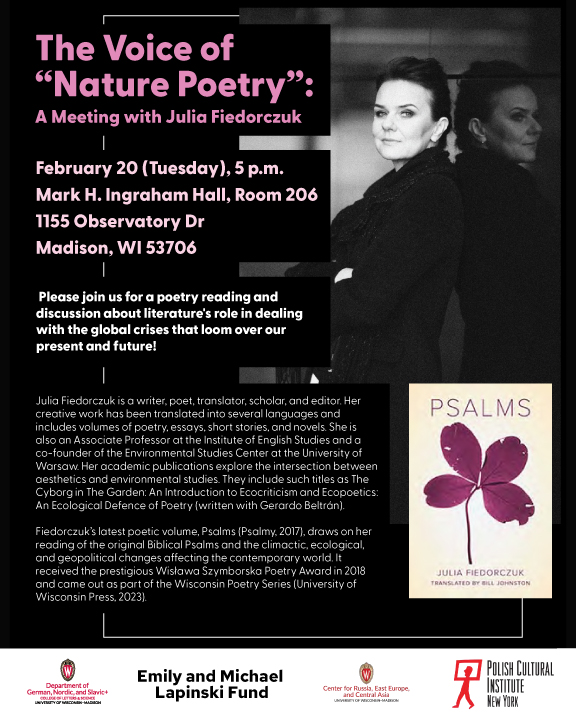In the last few years, global crises have disrupted the lives of millions of people, including a pandemic, Russia’s aggression against Ukraine, and the climate crisis. This month, the UW–Madison Polish Program is hosting a meeting with Julia Fiedorczuk, a contemporary Polish poet and author whose work deals with these issues. Please join us for a poetry reading and discussion about the role of literature in dealing with the global crises that loom over our present and future!
The event “The Voice of ‘Nature Poetry’: A Meeting with Julia Fiedorczuk” will take place on Tuesday, February 20, in Ingraham Hall on the UW–Madison campus. The meeting follows the 2023 publication of Fiedorczuk’s volume Psalms, inspired by the original Hebrew Psalms and translated into English by Bill Johnston, translator of Polish literature and Professor of Comparative Literature at Indiana University. The event is co-sponsored by the UW–Madison Department of German, Nordic, and Slavic+, the Emily and Michael Lapinski Fund, the Center for Russia, East Europe, and Central Asia, and the Polish Cultural Institute New York.

Julia Fiedorczuk is a writer, poet, translator, scholar, and editor. Her creative work has been translated into several languages and includes volumes of poetry, essays, short stories, and novels. She is also an Associate Professor at the Institute of English Studies and a co-founder of the Environmental Studies Center at the University of Warsaw. Her academic publications explore the intersection between aesthetics and environmental studies. They include such titles as The Cyborg in The Garden: An Introduction to Ecocriticism and Ecopoetics: An Ecological Defence of Poetry (written with Gerardo Beltrán).
Fiedorczuk’s latest poetic volume, Psalms (Psalmy, 2017), draws on her reading of the original Biblical Psalms and the climactic, ecological, and geopolitical changes affecting the contemporary world. It received the prestigious Wisława Szymborska Poetry Award in 2018 and came out as part of the Wisconsin Poetry Series (University of Wisconsin Press, 2023).
Event details: The Voice of “Nature Poetry”: A Meeting with Julia Fiedorczuk
Date and time: February 20 (Tuesday) at 5 p.m.
Location: Mark H. Ingraham Hall, Room 206, 1155 Observatory Dr, Madison, WI 53706
Event page: https://gns.wisc.edu/events/the-voice-of-nature-poetry-a-meeting-with-julia-fiedorczuk
* * *
UW–Madison Polish Studies Program
Educating the Wisconsin public about the Polish language, literature, and culture since 1936.
The University of Wisconsin–Madison Polish Studies Program is the oldest academic program in the United States focused on the study and teaching of the Polish language, literature, and culture. UW–Madison Polish studies offer a comprehensive package of Polish language, literature, and culture courses, a generous scholarship program designed exclusively for its students, and various extracurricular activities each academic year.
The program, dating back to 1935, offers beginning, intermediate, and advanced Polish language courses, in addition to intensive Polish courses for heritage speakers and (under)graduate students. In 2011, the program received the prestigious 2022 Award Distinction from the University of Warsaw for its achievements in promoting the Polish language and knowledge about Polish culture and history. The UW–Madison Polish program also offers a broad range of Polish culture courses on Polish film, contemporary Polish culture, Polish migration to the Americas, a survey of Polish culture from the Middle Ages to modern times, Polish comedy culture, and post-communism.
Each year, the UW Polish program awards scholarships for tuition through the Lapinski fund to undergraduate and graduate students studying the Polish language, literature, and culture. The Polish Student Association (PSA) provides a space for all students interested in events, activities, and learning about Poland and Polish culture. In collaboration with the Polish program faculty, the PSA also co-organizes the Madison Polish Film Festival, an annual celebration of Polish cinematography in Madison, Wisconsin, now in its fourth decade of existence.